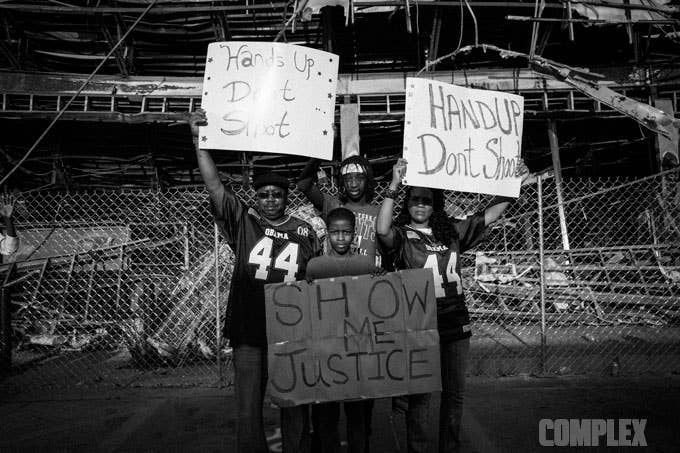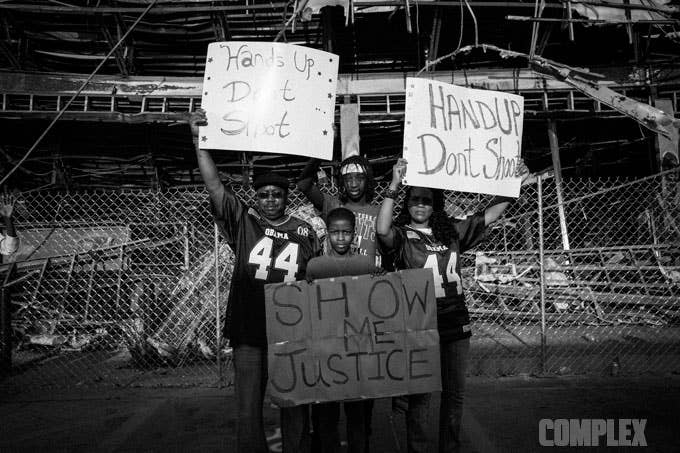
On August 9, 2014 Ferguson police department officer Darren Wilson shot and killed unarmed teenager Michael Brown. This is what we know so far about Wilson and the investigation.
Everything We Know About the Darren Wilson Case So Far
Friday, August 22: As protests continue in Ferguson, Mo. in response to the Michael Brown shooting, details about the investigation into the events are slowly beginning to crystallize. We now know that the man responsible is Darren Wilson, a six-year police veteran who spent his last four years as part of the Ferguson Police Department. Before the shooting, Wilson had no history of disciplinary problems. Those close to Wilson insist that he isn't a hot head, and that he's having a hard time dealing with taking a life. "Darren’s a good person and people have immediately labeled him as a cold-blooded murderer and that’s not the type of person he is," a friend said on Good Morning America.
We also know that Wilson's case is being handled as a grand jury investigation, and that St. Louis County prosecutors have already started presenting evidence—though the proceedings are being secret. As reported by USA Today, Attorney General Eric Holder has promised a thorough investigation of the events:
"Approximately 40 FBI agents and some of the Civil Rights Division's most experienced prosecutors have been deployed to lead this process,'' the attorney general said, adding that the federal autopsy he called for over the weekend was completed Monday. Like the family's examination, additional investigation is needed to determine critical facts, including whether Brown was facing the officer when he was shot and the distance between Brown and the officer at the time of the shooting.
Even if the grand jury deems it appropriate, Wilson won't be indicted until all of the evidence has been collected, a process that will take some time. "They will have absolutely everything there is, every piece of paper, every photograph, every bit of physical evidence, all of the forensic information," Attorney General Eric Holder said in a statement. According to reports, a decision about whether or not to indict Wilson won't happen until mid October.
The New Republic laid out what a grand jury investigation means, and how it differs from other investigations:
The grand jury, which consists of 12 people plucked from the local population, will sit around a table in a deliberation room somewhere in the county courthouse building. It’s the prosecutor’s show: He will present the case, starting with an overview and then bringing forward evidence. But it’s not like a trial. There will be no attorney for the other side, no judge, not even a bailiff. For most of the time, they will be alone except for the prosecutor and, on occasion, a witness who will be providing testimony.
As things currently stand, it's very much unclear whether the grand jury will actually choose to indict Wilson at all. Information about the shooting itself is still hazy, and reports are conflicting. Again, The New Republic breaks down the two scenarios surrounding the events:
According to one version of the story, Wilson was the aggressor. In one telling, the officer grabbed Brown by the neck and pulled him down to the squad car. Brown freed himself and took off, prompting Wilson to pursue and open fire. Eventually Brown stopped, turned around, and was trying to surrender when Wilson shot him dead. A private autopsy, conducted by the family, showed that Brown was shot at least six times, including once to the top of the head. The angle of that shot, the one that likely killed him, suggests that Brown, who stood at six-foot-four, had his head down when the bullet hit. That would be consistent with Brown trying to surrender.
In the other version of the story, Brown was the aggressor in the altercation, punching Wilson in the face and reaching for the officer’s gun. When the gun went off during the scuffle, Brown took off—only to stop and turn, taunt Wilson, and then charge at him. That’s when, according to this count, the officer shot Brown dead. A fatal bullet to the top of Brown’s head would also be consistent with this story, since Brown could have had his head down if he was rushing at Wilson.
To further bolster Wilson supporters, there are also unconfirmed reports that Wilson sustained serious injuries during his confrontation with Brown, some of which suggest that he had a fractured eye. The X-rays taken following the shooting will be made available to prosecutors.
Supporters of Daren Wilson, including a KKK affiliate, have already raised a substantial amount of money for his impending legal fees. "We need more white cops who are anti-Zog and willing to put Jewish controlled black thugs in their place. Most cops are cowards and do nothing while 90% of interracial crime is black (and non-white) on white,” the white supremacist group stated. But the KKK aren't the only ones supporting Wilson. According to the Huffington Post, a GoFundMe page set up for Wilson has raised more than $137,000 as of yesterday.
As for now, Daren Wilson remains a free man. In fact, it's so early in the case the case that prosecutors have yet to bring him in for questioning and his current location is unknown to the public as a safety precaution. We'll be updating continuously in this space as events transpire.

